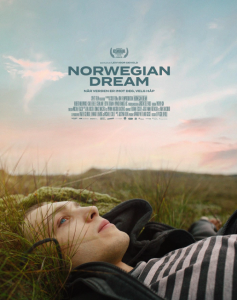
“Norwegian Dream”
(Norway/Poland/Germany)
Screened at the 41st Annual Reeling Chicago International LGBTQ+ Film Festival (3/5); Letterboxd (3/5), Imdb.com (6/10), TMDB.com (3/5)
Coming out stories have become a staple of LGBTQ+ cinema over the years, and, through the years, these offerings have increasingly come to distinguish themselves by incorporating greater and more specific details about the circumstances under which these tales unfold. Adding such context has significantly helped these films establish themselves as stories that go beyond being works of fundamentally basic gay-themed cinema. However, by including these additional narrative elements, it’s become incumbent on the creators of these pictures to seek to harmoniously integrate these supplemental aspects into their stories to make them more complete offerings. Such appears to have been the intent behind director Leiv Igor Devold’s third feature outing, the story of a closeted laborer (Hubert Milkowski) who leaves his native Poland to take a job in Norway, hoping that he’ll find a more tolerant way of life compared to the bigoted attitudes prevalent in his homeland. Upon arrival, however, he finds adjustment difficult, partly because he’s unaccustomed to his newfound freedom and partly because of other challenges faced by immigrant workers, such as the bald-faced disrespect often inflicted on them, issues related to the difficulty involved in union organizing and seeking ways to balance his life in Norway with that of relatives back in Poland. All of these story threads have merit, too, but this release struggles to find an effective degree of integration, prompting the narrative to frequently wander as if lost in the Scandinavian woods. That’s unfortunate, given that all the makings of an engaging story are present here, but they never quite gel into a cohesive whole, leaving viewers wondering exactly what the filmmaker and script writers were ultimately going for. Granted, the film shines a bright light on the widely held illusion of a “Norwegian dream,” one that sadly seems to mirror its equally illusory American counterpart, but, that consideration aside, this tale ultimately raises more questions than it answers, leaving viewers as unsatisfied as its disillusioned protagonist. Indeed, staying put might not be the wisest decision for someone in need of making a change, but then an alleged panacea might not be the answer either. As ambitious as it might be to try to convey that notion cinematically, some things just don’t work out in the end, as this film illustrates.




Leave A Comment